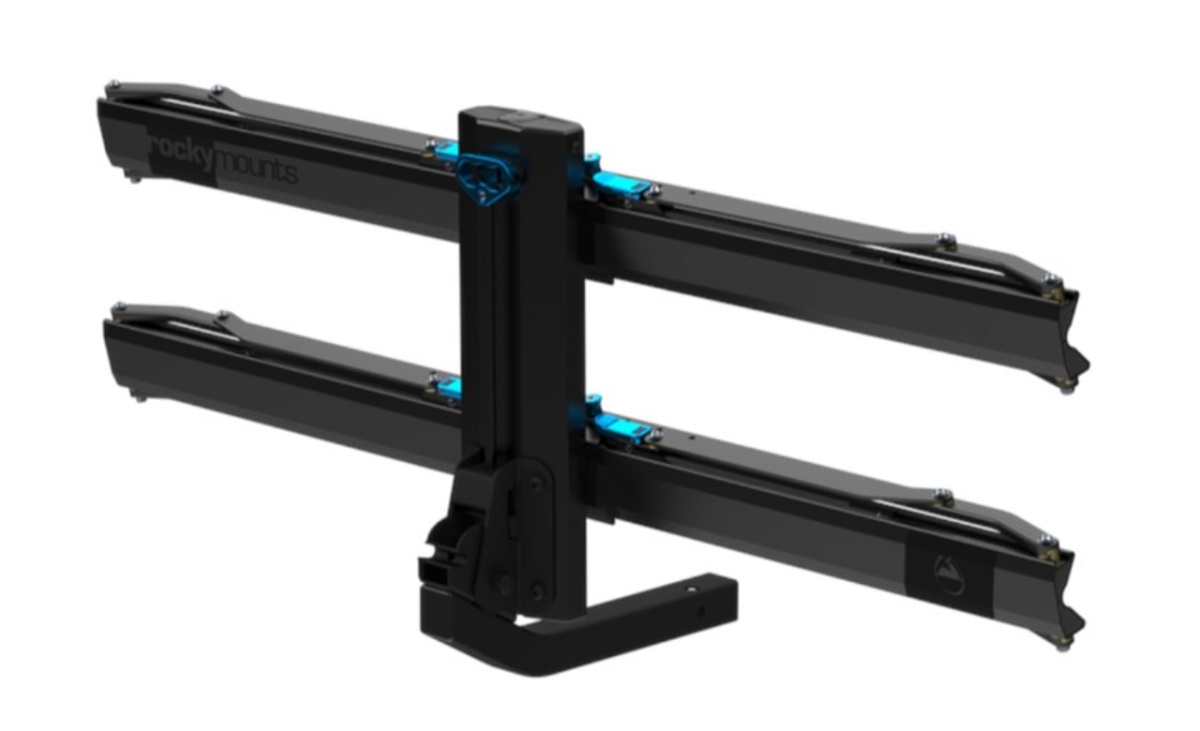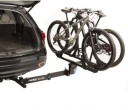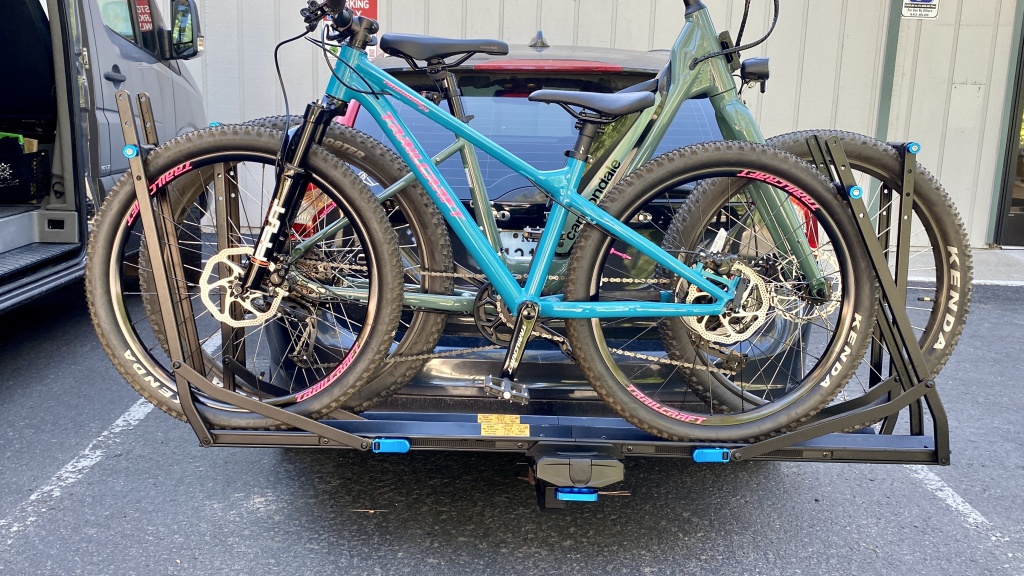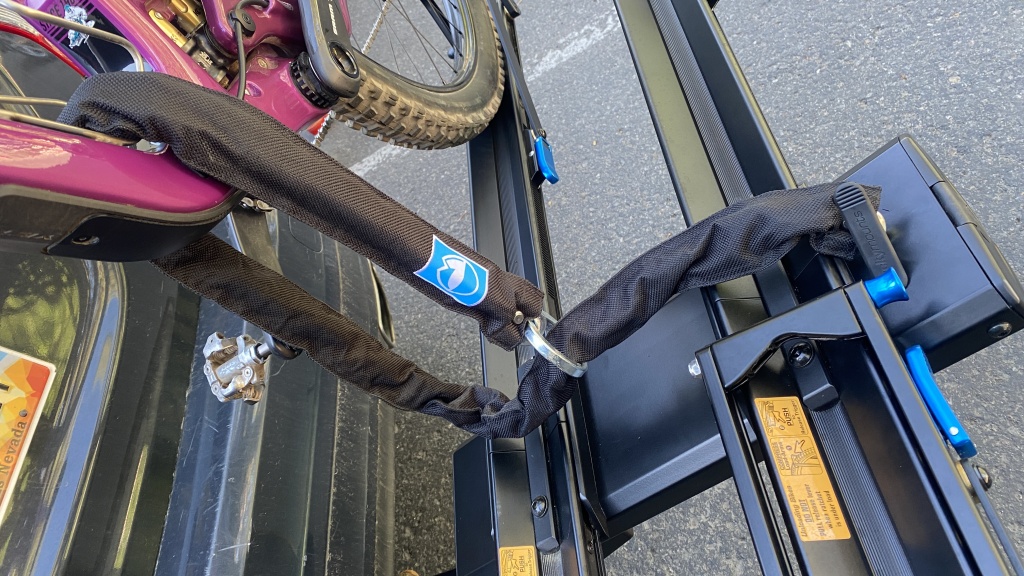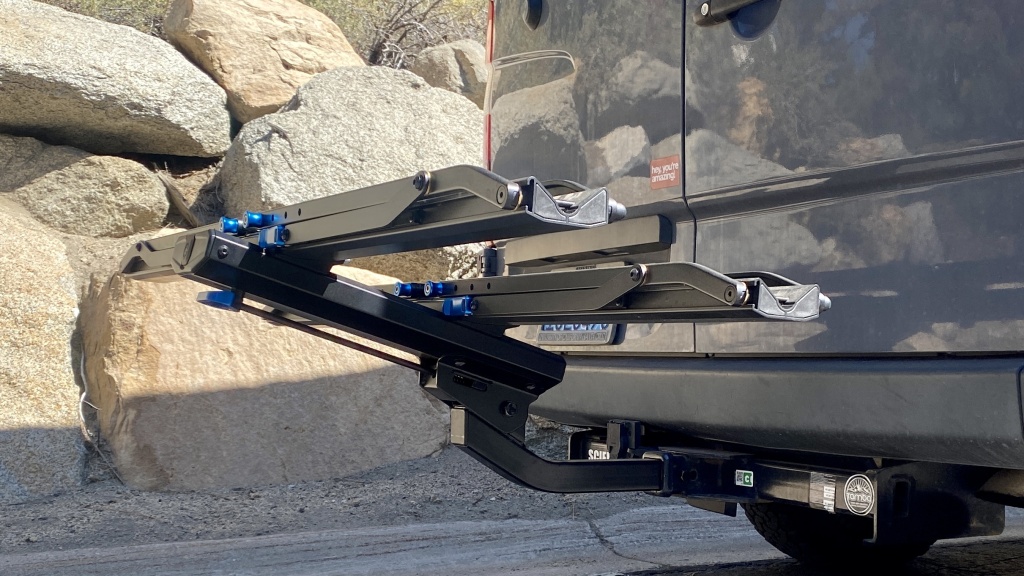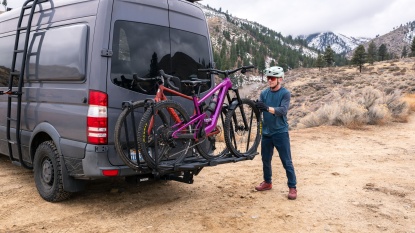RockyMounts GuideRail Review
Our Verdict
Compare to Similar Products
 This Product
RockyMounts GuideRail | |||||
|---|---|---|---|---|---|
| Awards | Best Overall Hitch Bike Rack | Best Hitch Rack Under $1000 | Best Bang for the Buck Hitch Rack | Best Swing-Away Rack | |
| Price | $849.95 at Backcountry Compare at 2 sellers | $1,098 at Backcountry Compare at 2 sellers | $734.08 at Amazon | $500 List $499.95 at Backcountry | $770 List $725.94 at Amazon |
Overall Score  |
|||||
| Star Rating | |||||
| Bottom Line | This rack combines durable construction, a great design, and hefty security but isn't as versatile or user-friendly as we'd have liked | A slightly paired-down version of the best rack we've tested, this rack is all business but still expensive | Versatile and easy to use with an excellent tilt-release function | This impressive rack is sturdy and user-friendly, with a lower price tag than the premium options | If you want a swing-away hitch rack, this is a great option that will allow you to access the back of your vehicle |
| Rating Categories | RockyMounts GuideRail | Kuat Piston Pro | Thule T2 Pro-XTR | RockyMounts Mono Rail | RockyMounts BackStage |
| Ease of EveryDay Use (20%) | |||||
| Ease of Removal and Storage (20%) | |||||
| Versatility (20%) | |||||
| Security (20%) | |||||
| Ease of Assembly (10%) | |||||
| Durability (10%) | |||||
| Specs | RockyMounts GuideRail | Kuat Piston Pro | Thule T2 Pro-XTR | RockyMounts Mono Rail | RockyMounts BackStage |
| Bike Capacity | 2 (Up to 3 with add-on) | 2 (Up to 4 with add-on) | 2 (Up to 4 with add-on) | 2 (Up to 3 with add-on) | 2 |
| Lock? | Locking hitch pin and security cable | Locking hitch pin, security key, and 12mm security cable | Yes | Yes | Yes |
| Rack Weight | 49 lbs (56 lbs 10 oz with security chain) | 62 lbs 11 oz | 51 lbs | 44 lbs 2 oz | 60 lbs 3 oz |
| Max Weight Per Bike | 60 lbs | 67 lbs (42 lbs RV) - dedicated 2" receiver version only, 60 lbs per bike - 1.25" receiver version | 60 lbs | 60 lbs | 60 lbs |
| Min/Max Wheel Size | 20" to 29" | 20" to 29" | 20" to 29" | 20" to 29" | 20" to 29" |
| Max Wheelbase | 55" or 1397mm | 53" or 1,346mm | 50" or 1,270mm | 50" or 1,270mm | 50" or 1,270mm |
| Max Tire Width | 3" | 5" | 5" | 5" | 5" |
| Loading Time | 7 seconds | ||||
| Other Sizes Available? | Comes in 1.25" and 2" receiver sizes, 1 bike add-on sold separately | Comes in 1.25" and 2" receiver sizes, 1 and 2 bike add-ons sold separately | Yes, 1.25" receiver and rack add-on for 2 additional bikes | Yes, 1.25" reciever, single bike add-on sold separately | No |
| Cross Bar Compatibility | N/A | N/A | N/A | N/A | N/A |
Our Analysis and Test Results
Based in Colorado, RockyMounts has produced quality bike racks since the 1990s. Their designs have steadily improved, and their offerings are now quite large. The GuideRail is their newest rack, and it's a design we're quite fond of, similar to the 1Up USA 2" Heavy Duty Double and Kuat Piston Pro X. While testing this rack, we carried every type of bike possible and logged serious miles along the way. The RockyMounts premium 3-axis anti-wobble system kept the hitch secure and minimized the bikes' movement, even on our worst trail approaches.
Performance Comparison
Ease of Everyday Use
The GuideRail is well suited for everyday use but isn't as versatile as the competition. It folds close to the vehicle when not in use and angles upward from the hitch to impact your vehicle's approach angle minimally. The load arm design feels user-friendly, and it makes loading bikes simple. Loading a bike requires unfolding the rack using the tilt pull handle and releasing it to its neutral carrying position. Once unfolded, the user unlocks a ratchet at the base of each load arm. Doing this allows the load arms to expand upward and a bicycle to be clamped in the center. The design makes sense because the rack doesn't interface with your bike's fancy bits, just the tires. The load arms use small bridges to interface with the top of the tires; adjusting for different wheel sizes requires tools, so if you're not always using bikes with the same wheel size, this rack is less convenient. The low loading height and load arms that move clear of the deck make loading bikes simple. Once loaded, the two load arms come together to pinch the bike in place. Each load arm folds over a wheel, contacting only the tires and ratchets at the bottom of the load arms to tighten its grip.
Tightening the fit of your bike in the rack is as simple as pushing inward on the load arms; the ratcheted arms allow the bike to be squeezed in place. There are no straps over delicate carbon wheels and no plastic trays; in fact, there is not much plastic at all. This rack is built of quality materials, and plastic use has been minimized. Due to the width of the load arms, the maximum tire width for this rack is 3", which may create limitations for some users.
One of the things we liked about the GuideRail was the tilt release handle. This handle is prominently located on the outside of the rack when it's in folded position. A quick pull of the blue handle lets you move the rack from its stored position to flat/load position to downward tilt. The downward tilt allowed us access to the hatchbacks we tested with, but even the empty rack prevented us from using the rear doors on our vans. In general, this rack isn't recommended for vans as it also holds bikes too close to the rear of the vehicle; we had interference issues with handlebars as narrow as 760mm. There were no issues with its use on trucks, but as with all hitch racks, be mindful of where your tailpipe exhausts, as the heat can damage your bicycle.
Ease of Removal and Storage
The GuideRail is fairly easy to remove and store, although it doesn't reduce beyond its folded dimensions. Putting the wheel trays against a wall prevented the rack from tilting backward and having an even larger footprint. Like most other hitch bike racks, their size becomes a liability when off the vehicle. The GuideRail occupies an average amount of floor space without disassembling the rack. Installation requires a wrench to tighten the hitch pin; once tightened, the hitch locks into place with an anti-wobble feature. Anti-wobble features are common, but tool-free installation is becoming more common, so GuideRail loses some ground in this metric. Once tightened, the hitch pin can be locked to the vehicle with the included hitch pin lock. The tool-free design utilized by the Thule T2 Pro was significantly easier to use.
The GuideRail isn't overly built, tipping our scales at 49 lbs, (56 lbs 10 oz. with security chain) but it's also, not light. Moving the rack from the hitch to a resting place on the garage floor is a two-handed job where you protect your toes. While lighter racks are preferable in this metric, most of these racks are in a similar range of weights. The Kuat NV 2.0 weighs 57 lbs 10 oz. and it does feel more difficult to move around our warehouse. The GuideRail picks up serious weight with its security chain which oddly isn't to be used while the vehicle is in motion. We would have preferred a cable that is more convenient and could be used for the duration of a road trip. Even if the cable wasn't as secure, the convenience of being able to leave your bikes locked outweighs the added security of the almost 8 lb chain.
Verstaility
While testing, we appreciated the GuideRail for its simple design and easy load functionality. Built to hold wheels up to 3", fat tire bikes and snow bikes won't fit the load arms. Wheelbases from 36" to a massive 55" can be transported, accommodating even most long beach cruisers. Each tray can hold 60 lbs, if you add the third bike attachment, the weight limit goes down to 45 lbs per tray. Those transporting e-bikes may need additional capacity and maybe even a loading ramp. RockyMounts will soon offer a ramp for this rack to assist in loading, it will reportedly cost $99.
The rack can be had in 2" and 1.25" receiver sizes for the same price. Fit and function when mounted on an SUV were excellent; we were able to utilize the tilt function and access the hatchback without much trouble. Across the board, the rack worked well with most vehicles; not surprisingly, there was interference when used with our vans. An 8" hitch extension is available to clear the interference, but a better solution for vans is simply a swing-away rack.
The load arm clamps hold the bike only by the tires; bikes with fenders are not compatible. The minimum wheel size is 20" at the load arms' narrowest spread of 36"; we had no issues fitting kid or adult-sized bikes on this rack during testing. Since we could adjust the load arms, the adjustment range is almost infinite; moving a bike forward or backward on the tray allows for interference-free transport.
Ease of Assembly
The GuideRail requires some assembly, you needn't be a mechanic but being able to follow written directions will be helpful. The easiest way to assemble a hitch rack is to load the hitch into a receiver on a vehicle and attach the parts to the secured section. Once the hitch is resting in the receiver, it's quite simple to hang the parts on and tighten things up. We found the process to be pretty straightforward, and all of the required tools were provided. Plan on spending about 20 minutes reading the directions and completing the assembly.
The packaging is neat, and the directions are simple to follow. The spine of the rack is pre-assembled and the bulk of your work is removing packaging and attaching the load arms. RockyMounts has a video on their website that walks you through assembly and gives some helpful user tips.
Security
Keeping your bike secure is a major concern and RockyMounts has taken some security measures with the GuideRail. The locking hitch pin is pretty standard equipment and prevents someone from taking your rack off of your vehicle. The lock provided fits over the hitch pin, locking it in place, and utilizes a rubber cover to keep the elements out of the lock assembly. The hitch locks themselves don't feel particularly durable, but they're an important line of defense.
Two keys are included with the GuideRail, and they work for both the hitch pin and the security chain. The security chain is amongst the most robust we've seen included with a rack. The monstrous 4-foot chain is undoubtedly a theft deterrent, the 10mm square links are cloth-wrapped to protect finishes. RockyMounts says not to use the chain on your bicycle while the vehicle is in motion, but locking your bike every time you stop and unlocking it every time you want to drive is a painful hassle and diminishes the effectiveness of this security feature.
The security chain has a large circle on one end allowing you to use it like a noose; simply slip the chain over your bike and pull the chain back through the circle to create a loop around your bike frame. The end of the chain inserts into a cutout on the spine of the rack where it's locked into place. The chain is long enough to lock two bike frames but you can't easily lock the wheels.
Durability
The GuideRail is made almost entirely of metal with very few plastic or rubber pieces to wear out. We put some tough miles on this rack in nasty weather, and it cleans up to look brand new. Similar to the 1Up USA and Kuat Piston Pro-X racks, foregoing the use of plastics should extend the lifespan of this rack beyond its plastic-clad counterparts.
The finish on this rack is top-notch and maintains its shine well, the graphics are subtle, black on black. The hardware is stainless or brightly anodized blue aluminum bits that pop in contrast. The hitch pin tightens the 3-axis anti-wobble device inside the hitch arm, limiting the racks' wobble and wear; it's an effective system, just not the easiest to use. Rubber covers on the lock mechanism and chain terminal should keep grime out and minimize maintenance intervals.
Should I buy the RockyMounts GuideRail?
There is an undoubted appeal to the load arm style racks, from their interface to their simplicity, there's much to like about this type of rack. The GuideRail is sleek and well-made with some convenient features but it's shy of excellent. If you generally transport bikes with the same-sized wheels and don't mind the limitations of the security chain, this rack works quite well. Its construction, finish, and hardware all point to a long life ahead but it's 3" max wheel trays and the need for tools to make adjustments leave it just off the mark.
What Other Hitch Bike Racks Should You Consider?
If you like the general design of this rack, you're in luck. This rack uses the 1Up USA design, the original 1Up USA is a brilliant rack that we loved but it ranked poorly in the security metric of our review. Since our review, they've made security improvements, and it's worth checking out. If your budget isn't restrained, the Kuat Piston Pro X, which utilizes the same basic design, is spectacular. It's the most expensive rack in our test but far outperformed the rest. Another great choice is the Thule T2 Pro XTR, it's solid design and ease of use have made it a GearLab favorite.


